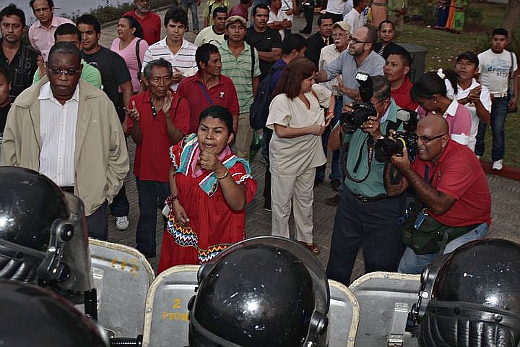Panama president to repeal mining law reform
Published by MAC on 2011-03-08Source: Reuters, News Room Panama
Panama president says will repeal mine law reform
By Sean Mattson and Euan Rocha
Reuters
4 March 2011
PANAMA CITY/TORONTO - Panamanian President Ricardo Martinelli on Thursday asked lawmakers to repeal a recent law that allows foreign government investment in mines within the Central American country.
|
|
| Angry protesters outside the legislative palace. Photo: Panama News |
The law, passed less than a month ago, is crucial to Canada's Inmet Mining, as the company plans to partner with state-owned firms such as Korea Resources Corp in a bid to finance and build the $4.3 billion Cobre Panama copper-gold project in the country.
Martinelli, who originally championed the new law, made the surprise announcement about the repeal at a meeting with an indigenous community in Western Panama. The group has strongly protested against the legislation.
Martinelli rushed the repeal proposal through an emergency cabinet session in Panama City on Thursday. And Trade Minister Roberto Henriquez has taken the proposal to the legislature asking lawmakers to repeal the law in its entirety, according to government statements.
The legislature is expected to approve the repeal when it reconvenes in the coming days.
Inmet's Chief Executive Jochen Tilk said that the government did inform Inmet of plans to repeal the new mining law.
The company does have the right to proceed with the development of the project, but the fate of its proposed tie-ups with foreign state-owned investors will probably only be decided when a new law is enacted, Tilk told Reuters in an interview late on Thursday.
"We think we can develop the project, as it affects partners it will really depend in the end on how the final code will be enacted," he said.
Tilk said he was confident the move to repeal the law will not delay the development of the project, as the company has a strong enough balance sheet to "initiate the process" of developing Cobre Panama.
"There are clearly many options and different types of funding support (that we can tap)," he said.
Tilk said the government's move to repeal the new law is aimed at giving indigenous communities and other stakeholders an opportunity to express their views, before a new code is enacted.
"We do support this and think this is the right approach and we think the government is taking the right step to include the indigenous communities," he said.
A spokeswoman for Martinelli's office said there was no word on whether another reform of the original 1960s-era mining law that had blocked foreign government investment in the sector would be presented to lawmakers.
She said lawmakers planned to meet with indigenous leaders to discuss possible reforms in the coming weeks.
Inmet's project is expected to produce more than 250,000 tonnes of copper a year, as well as significant quantities of gold, silver and molybdenum over a 30-year life span.
Toronto-based Inmet, which owns copper mines spread across Turkey, Finland and Spain, is in the process of attempting to acquire rival Lundin Mining.
However, the company's friendly deal with Lundin could be derailed by a counter offer from Equinox Minerals worth about C$4.8 billion. Many analysts doubt that Inmet will enter into a bidding war for Lundin, as it needs to build a war chest in order to finance Cobre Panama.
Inmet's shares, which closed Thursday at C$69.12 on the Toronto Stock Exchange, have risen more than 60 percent over the last six months, driven largely by strong demand and prices for copper. ($1=$0.97 Canadian) (Reporting by Sean Mattson in Panama City and Euan Rocha in Toronto; Editing by Clarence Fernandez)
Government backs down: mining reforms dead
4 March 2011
After earlier claims that 80 percent of Panamanians were in favor of mining expansion the government has moved to kill a law, in place for less than a month.
On Thursday, March 3, the Cabinet Council approved a measure that would repeal the mining reforms that led to weeks of protests across the isthmus. The protests also led to the expulsion from the country of a La Prensa columnist raising concerns in Panama and abroad that the expulsion was politically motivated. Indigenous leaders called for the journalist to be allowed to return.
President Ricardo Martinelli, had vigorously refused to consider canceling Law 8 and had called the president of South Korea when it was passed. The bill, reflecting Martinelli's previously announced views that Panama would be open to more mining, passed through the National Assembly with little discussion, and was quickly signed into law by the president.
After meeting with indigenous leaders in Chiriquí who had spearheaded the demonstrations, Martinelli said he would propose the reforms be overturned, saying surveys showed that 75 percent of the population does not want mining expanded. He convened a special meeting of the Council to deal with the issue, and it voted to repeal the reforms.
Minister of Commerce and Industry Roberto Henríquez will present a bill to the National Assembly to repeal the reforms.
